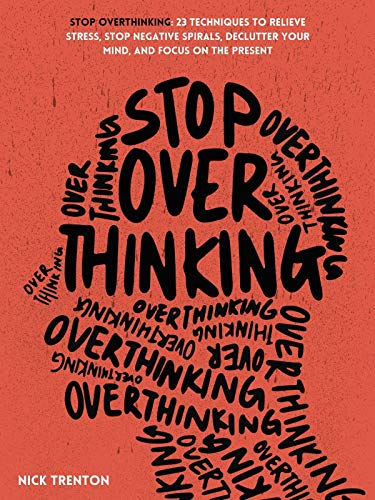Let us be honest here, If you obsessively analyze past events and worry about future events to the point where you cannot focus on a simple task, you are overthinking.
According to Nick Trenton, author of Stop Overthinking: 23 Techniques to Relieve Stress, Stop Negative Spirals, Declutter Your Mind, and Focus on the Present, Overthinking is when you excessively analyze, evaluate, ruminate, and worry about specific things to a point where it starts affecting your mental health because you simply can’t stop.
We have all been there and it is totally fine. But if it becomes a recurring habit and you start referring to yourself as an overthinking person, then to a certain extent, this is not good for you.
Yes, overthinkers knock the nitty-gritty details out of the park but, they also sometimes find themselves in an emotional rut, too deep that they can’t overthink themselves out of it.
Nick Trenton attempts to make a case that there are two main sources of anxiety which lead to overthinking.
- Me and you—ourselves. While some of us may be natural overthinkers, and take this as a genetic predisposition towards anxiety, others are habitual overthinkers. With them overthinking is basically a routine and they go down that road when things come up, decisions have to be made and so on. This turns into a vicious cycle that can be hard to escape.
- The environment around. Cluttered environments that are dimly lit and market-level noisy greatly affect the state of your mind. They make you more anxious than you can imagine. You have got to Feng shui the hell out of your environment. For your creativity to be inspired, you have to be in an environment that rids you of any distractions so that all you have to do is to work, better.
The one thing that we may all find to be true is the fact that it is nearly impossible to think your way out of overthinking, even if you devise the most perfect plan, your mind will continue to race if your anxiety remains high.
So here are Nick Trenton’s powerful methods to rapidly reduce your anxiety and regain control of your mind when your mind is racing:
Use the 5, 4, 3, 2, 1 method
Commonly referred to as the 5-second rule, this method will interrupt your state of mind long enough for you to regain a sense of control. It has been used by people to overcome fear and do hard things, Doctors use it for patients who need to overcome panic attacks.
This is how it works:
Slowly count down from five to one. As you do use each number as a cue to engage one of your five senses.
- Five, look at five objects in your environment.
- Four, hear four distinct sounds around the room or where you are.
- Three, feel three sensations.
- Two, detect two smells and make sure they are good otherwise you will be distracted by fowl smells..
- One – identify one taste.
The goal here is to have an awareness of your environment long enough to lower your anxiety in your body and regain a sense of control. Look around you and try to find things that stand out. This means that you focus less on continuing your overthinking and you disrupt the pattern.
Use the Counter Belief Experiment
It is quite common for people to have an overthinking episode driven by a paralyzing belief. For example, if your mind is running 100m laps before you meet your boss, this is perhaps because you feel you are not ready or even the fact that your boss may say no to what you want.
You can stop overthinking by taking the following steps to challenge anxiety inducing belief:
- Clarify the belief by asking yourself, “What must I believe about myself, others, or the future to justify my anxiety?”
- Counter the belief. If you believe your boss scares you, counter that by saying, “I am not scared of you [insert boss’ name].
- Now, this is where you conduct the counter belief experiment. Live the next sixty seconds as if you are not scared of your boss and in fact, you can also throw in some spice by telling them that they do not scare you at all. (You are doing this in your mind for sure.
- Look for evidence that supports your counter-belief. This is where you remember that you have faced your boss before and this overthinking is not doing you any good.
When you discover evidence to support a counter, belief, you begin doubting your original belief, which lowers your anxiety and calms your overthinking mind.
Consider Worry Postponement
Try this the next time you are worried about something. Set an appointment on your calendar with yourself to worry about xyz. Sometimes our worries are justified in their existence but not in their timing. When a worry pops up in the middle of a company pitch, make a note in your mind to deal with it later. This helps you be in the moment and allows you to bring your best self. In some cases, you may even forget what you are worried about.
In many cases, our worries just want to be acknowledged. By creating a set time to worry, we acknowledge our worry and confine it to a short block of time so that it doesn’t leak into all hours of the day. No wonder author Nick Trenton says, “Worry postponement is a very direct and effective way of interrupting anxiety spirals…We can seldom eliminate worry from our lives, but we can consciously limit its time of onset and duration.”





































